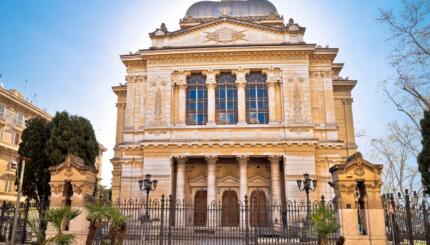Chapters in American Jewish History are provided by the American Jewish Historical Society, collecting, preserving, fostering scholarship and providing access to the continuity of Jewish life in America for more than 350 years (and counting). Visit www.ajhs.org.
In the textbook version of history, we are told that the first English settlers – the Puritans of Massachusetts Bay Colony, or the followers of Anne Hutchinson in Connecticut – came to America in search of religious freedom. The full story is more complex. Protestant groups did seek the New World as a haven for religious liberty –their own! What the textbooks usually omit was that equal liberty was often denied to others, particularly Catholics and Jews. One of the first persons charged with blasphemy in the English colonies was a Jew: Jacob Lumbrozo of Maryland.
Established in 1634 by a Catholic, Cecilius Calvert, Lord Baltimore, under a grant from King Charles I of England, Maryland was intended as a refuge for Calvert’s co-religionists. At this time, English Catholics were far more persecuted than atheists, Muslims or Jews. Appreciative of being allowed to create a Catholic haven in the colonies, Calvert gave his appointed governor in Maryland careful instructions not to offend the surrounding Protestant majority. Catholic masses were to be said in private. Further, the governors should “treat the Protestants with as much mildness and favor as Justice will permit.” He was silent on the question of Jews.
Calvert encouraged Puritans from neighboring Virginia, themselves an unpopular minority, to settle in Maryland, which they did in unexpected numbers, soon becoming the majority. In 1649, to keep the Puritans from persecuting Catholics, Calvert submitted an “Act Concerning Religion” to the Maryland General Assembly. The act’s primary provision proclaimed that any believer in Jesus Christ, regardless of which church he attends, should be tolerated. No form of Christianity was to be exalted over any other.

Help us keep Jewish knowledge accessible to millions of people around the world.
Your donation to My Jewish Learning fuels endless journeys of Jewish discovery. With your help, My Jewish Learning can continue to provide nonstop opportunities for learning, connection and growth.
While placing Catholics on an equal footing with Protestants, the act took aim at all those –including Jews – who denied the divinity of Christ. Those who “blaspheme God . . . or deny our Saviour Jesus Christ to be the sonne of God, or shall deny the Holy Trinity . . . shall be punished with death and confiscation or forfeiture of all his or her lands and goods to the Lord Proprietary and his heires.”
Maryland’s Puritans resented the act, as it forced them to tolerate Catholics. In 1654, they rose up in arms, removed Calvert’s governor after a fight known as the “Battle of the Severn,” renounced Calvert’s rule and expelled all Catholics from the General Assembly. For two years, Catholics could not worship in Maryland and members of the Jesuit order were expelled. Curiously, the punishment for blasphemy was reduced from death to mere admonishment.
In 1656, Calvert persuaded Oliver Cromwell to restore his title. Upon resuming control, Calvert ordered that the 1649 act be reinstated, including its provision that blasphemy be punished by death.
Ironically, one of the first persons tried under this law was a Jewish physician, Jacob Lumbrozo, whom historian Abram V. Goodman describes as a 1656 immigrant to Maryland from Lisbon, Portugal. There, Lumbrozo had lived as a Christian, but New World freedoms permitted him openly to practice Judaism. While Puritans and Catholics fought each other, they mostly ignored the few Jews who lived in Maryland. While Jews could not vote or hold public office, they were treated more as a curiosity than a threat. Enjoying such indifference, Lumbrozo miscalculated how freely he could proclaim his beliefs.
In 1658, Lumbrozo met a proselytizing Quaker named Josiah Coale. Within the hearing of witnesses, Coale asked Lumbrozo a number of theological questions. Lumbrozo answered honestly, according to his faith. A short time later, he was accused of blasphemy and called to a hearing. Witnesses testified that to Coale’s question, “Did the Jews believe in a messiah?” Lumbrozo answered in the affirmative. Coale asked who was crucified at Jerusalem. Lumbrozo answered, “A man.” And how did he perform his miracles? “By the art of magic.” And the resurrection? Lumbrozo speculated that disciples probably stole the corpse. Another man present accused Lumbrozo of calling Jesus a necromancer. The court transcript notes, “To which said Lumbrozo answered nothing but laughed.”
Having sufficient probable cause, the court required that Lumbrozo post bail. Before his trial could resume, however, the governor of Maryland, celebrating the accession of Richard Cromwell as Lord Protector of England, issued a pardon to all who “stood indicted, convicted or condemned to die.” Lumbrozo’s case dropped from the record.
Five years later, in 1663, Lumbrozo served on a jury and acquired denization papers, which granted him all the rights of an English citizen. Soon after, he was allowed to represent his two indentured servants in a court case. One can conclude that Lumbrozo’s principles – affirming that he did not believe that Jesus was the messiah – only temporarily got him in trouble with the law. Not until 1823 were Jews finally granted full relief from Maryland’s discriminatory religious laws but, fortunately, no other Jews were charged with blasphemy after Lumbrozo, and no Marylander of any religion was ever put to death for the crime.


